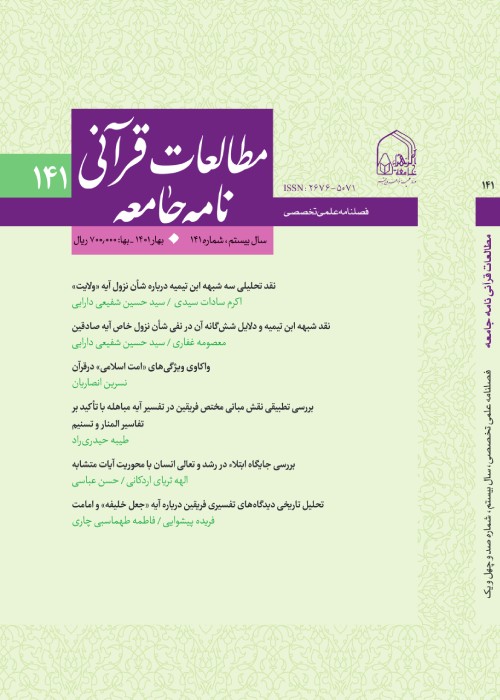A Comparative Study of the Role of Fundamentals Specific to Fariqain in the Interpretation of the Mubāhilah Verse Emphasizing Al-Manār and Tasnim Interpretations
The early and late Fariqain commentators, in their interpretive attitude, have considered the Mubāhilah verse from historical, literary, theological and legal aspects, and each of them, with the purpose of proving or refuting, has interpreted it with a different approach and results. This article, using a comparative approach, aimed to investigate the role of Fariqain’s specific fundamentals in their type of attitude and analyze their opinions with a focus on Tasnim and al-Manār interpretations. The results of the study showed that Fariqain commentators, according to their specific fundamentals, have raised a range of differing views about the cause of revelation and the words of the above-mentioned verse, which have commonalities and differences. While the evident agreement among some of these views has led to convergence in the interpretation of some terms, some others are in disagreement which is affected by the criteria of Fariqain’s specific fundamentals. This research was conducted using the descriptive-analytical method and library sources, and the findings indicated that according to Ibn Taymiyyah and Rashīd Riḍā, Mubāhilah verse is not deemed specific to certain individuals and the Christians of Najran, narratives regarding the cause of revelation are fabricated, the word “Abnā’” does not include daughters’ children, and Hazrat Zahra (SA) and Hazrat Ali (AS) are not regarded instances of “Nisā’ and Anfus” and that the immediate caliphate of Imam Ali (AS) is not accepted by Alousi. On the contrary, Shiite commentators (including Tabarsi, Balaghi Najafi, Tabatabaei, and Javadi Amoli) consider the verse to be specific to certain people, and the offsprings of Hazrat Zahra (SA) and Hazrat Ali (AS), respectively, to be instances of the words “Abnā’, Nisā’, and Anfus” and demonstrate the superiority of Ahl al-Bayt (AS) and the immediate caliphate of Imam Ali (AS) by referring to the verse, and some Sunni commentators (including al-Qurtubī and Fakhr al-Dīn al-Rāzī) agree with the Shia in some cases.
- حق عضویت دریافتی صرف حمایت از نشریات عضو و نگهداری، تکمیل و توسعه مگیران میشود.
- پرداخت حق اشتراک و دانلود مقالات اجازه بازنشر آن در سایر رسانههای چاپی و دیجیتال را به کاربر نمیدهد.



